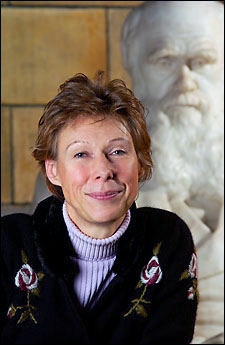British historian of science Janet Browne, known for her work on the history of 19th century biology, has specialized in re-evaluating the life, times and work of Charles Darwin. She will present the Thomas Hall Lecture “Charles Darwin and the Economy of Nature: Money, Metaphor and Adaptive Capital” at 4 p.m. on Thurs., Nov. 15 in the Laboratory Sciences Building auditorium.

Browne and Darwin
Browne won critical acclaim for her two-volume biography of Darwin. Charles Darwin: Voyaging (1995) and Charles Darwin: The Power of Place (2002) have been widely read by a general audience and described by reviewers as “monumental” and “definitive.” Power of Place won the National Book Critics Circle Award for biography, the Pfizer Prize for Biography from the British History of Science Society, and the Royal Society of Literature Prize.
Beyond the scope of Darwin’s personal life, professional relationships and influence, her biography has also been described as a “collective biography” of the social, intellectual and political network of the Victorian scientific community. She helps the reader understand how Darwin’s evolutionary idea was created and propagated in scientific circles and to the public.
Browne developed her expertise on Darwin by analyzing over 14,000 letters while working as associate editor of the early volumes of The Correspondence of Charles Darwin, a continuing multi-volume series, published since 1985 by Cambridge University Press. Included in the “Books That Changed the World” series (Atlantic Monthly Press) is Browne’s book, Darwin’s Origin of Species: A Biography (2006). She is currently collaborating on a book on the gorilla as an object of scientific and cultural concern since the late 1800s.
Browne is Aramont Professor of the History of Science at Harvard University. She holds a B.A. in natural sciences, awarded in 1972 by Trinity College, Dublin, and M.S. and Ph.D. degrees in the history of science, awarded by Imperial College, London, in 1973 and 1978, respectively. Among other positions, she lectured in the history of science at the Wellcome Institute and University College, London from 1983 to 1996 and was a reader in the history of biology from 1996 to 2002.
She has been editor of the British Journal for the History of Science and president of the British Society for the History of Science.
The event is free and open to the public. The Laboratory Sciences Building is located north of Graham Chapel and west of the Women’s Building on the Washington University Danforth campus.
For more information, call (314) 935-4620 or visit the Assembly Series Web page (http://assemblyseries.wustl.edu).